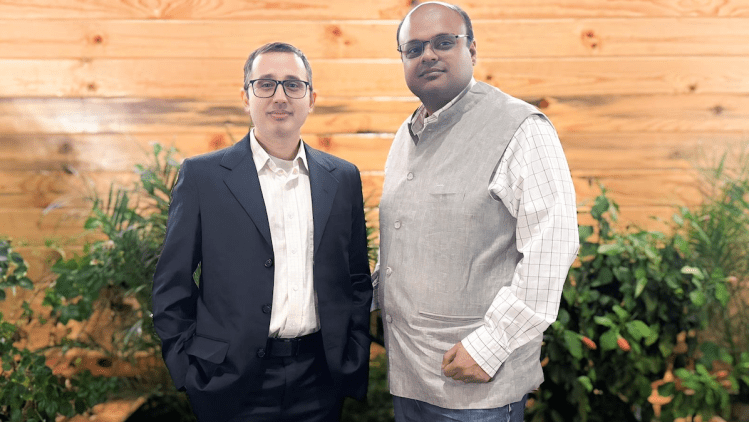Imagine a world where every student has their own personal math tutor—one that’s available 24/7, never loses patience, and adapts perfectly to their pace of learning. That’s the vision behind StarSpark AI, an innovative platform rooted in latest neuroscience research applied at scale using AI, co-founded by Ashish Bansal and Rohit Joshi. With deep roots in artificial intelligence and education, these founders are challenging the traditional model of learning.
Ashish and Rohit didn’t set out to build just another AI tool. As parents, they were dissatisfied with the math education their children were receiving. “ Unlike existing solutions, we wanted something that was effective and engaging—something our own kids would love,” Ashish explains. So, they left high-profile roles at Google and Meta to tackle this problem head-on. What resulted is a product designed to make quality math education accessible to anyone, anywhere.
Why AI tutors matter
Studies show that personalized tutoring significantly boosts learning outcomes. For example, Benjamin Bloom’s seminal research demonstrated that students receiving one-on-one tutoring outperform 98% of those in traditional classrooms. But traditional tutoring is expensive, and not everyone can access it. This is where AI steps in, offering a scalable solution to a longstanding challenge.
StarSpark’s AI tutors aren’t like generic chatbots. They don’t just spit out answers. Instead, they guide students step-by-step through problems, mirroring the Socratic method of teaching. A Stanford study supports this approach, showing that AI tutors improve student outcomes, provided they don’t simply supply answers like popular chatbots often do.
This distinction is crucial. A recent study from UPenn revealed that while human tutors and Socratic AI tutors enhanced student performance, Chatbot solver models actually hindered it. Ashish is passionate about this difference. “We don’t want students to use AI to do their thinking for them. We want students to develop the skills and confidence to tackle challenging questions independently,” he says.
Rethinking how math is taught
One of StarSpark’s key innovations is its approach to math as a muscle rather than an innate talent. “Math is like a muscle, and everyone can build a six-pack,” Ashish explains. “If you don’t exercise, it weakens. But with practice, it grows stronger.”
Traditional math education often emphasizes standard methods for solving problems, which can alienate students who think differently. StarSpark offers alternative pathways, allowing students to explore multiple methods and take ownership of their learning process. This flexibility not only builds confidence but also fosters a deeper understanding of math concepts.
Visualization is another cornerstone of StarSpark’s philosophy. Research from Math for All highlights the importance of multi-sensory input—like drawing, writing, and even touching fingers while counting—for effective math learning. StarSpark’s platform incorporates these neuroscience insights, using animations and illustrations to make abstract concepts tangible.

Building with neuroscience
Before launching StarSpark, Ashish and Rohit spent months researching the most effective way the brain learns, makes the right connections and retains long term memory. This deep exploration into neuroscience informed every aspect of their product. “We wanted to create something that wasn’t just functional but transformative,” Rohit shares. “If it doesn’t work for our kids, it doesn’t go to market.”
The founders’ personal connection to their work is evident in the details. Both men cracked India’s elite IIT entrance exam on their first try and have a combined 30+ years of experience in AI at companies like Google and Meta. Ashish even wrote an award-winning book on machine learning.
Tackling challenges in education
The global teacher shortage is a well-documented crisis. In the U.S. alone, there’s a deficit of over 41,000 qualified teachers, with another 365,000 educators teaching subjects they aren’t certified in, according to the Learning Policy Institute. Worldwide, the United Nations predicts a shortage of 44 million teachers by 2030.
This shortage disproportionately affects rural areas, where a single teacher might be responsible for multiple subjects across grades. For StarSpark, these statistics aren’t just numbers—they’re a call to action. By offering AI-powered tutors, the company hopes to provide a lifeline for students in underserved communities. This is reflected in the partnership with nonprofit organizations, devoted to education like DIL.
Breaking language barriers with DIL
Education isn’t a one-size-fits-all solution, especially in a world where millions of children face barriers like language and accessibility. StarSpark has partnered with DIL to provide math tutoring in Urdu for thousands of children in Pakistan. Ashish believes this is just the beginning. “Math is universal, but language often creates barriers. Our AI tutors are multilingual, so students can learn in their native language without sacrificing quality. We look forward to expanding such partnerships in other regions.”
This feature not only helps bridge educational gaps but also aligns with StarSpark’s broader goal of making quality math education available to students everywhere.
Measuring success with MetaMetrics
Credible and measurable outcomes are a cornerstone of StarSpark’s mission, which is why the company partnered with MetaMetrics, a trusted name in educational measurement.
MetaMetrics’ Quantile® measures are used in schools across all U.S. states, making them a reliable benchmark for academic progress. Through this partnership, StarSpark ensures that improvements students achieve on the platform align with their school assessments.
“Parents and educators want proof that a tool works,” Ashish explains. “By integrating Quantile measures, we can show measurable progress in the classroom that validates the effectiveness of StarSpark’s methodology.”
A vision for the future
StarSpark isn’t content with incremental change. Its founders envision a world where every child has access to a math tutor that’s as effective as it is compassionate. They see their platform not as a replacement for teachers but as a tool to make education more equitable and impactful.
In Ashish’s words: “Farmers didn’t stop farming when tractors came along. They used the technology to become more productive. That’s what we’re doing for education—giving students the tools they need to thrive in a world where AI is a reality.”
For anyone interested in the future of education, StarSpark offers a compelling glimpse into what’s possible. The work is just beginning, but the goal is clear: better, smarter learning for every student in the world.
VentureBeat newsroom and editorial staff were not involved in the creation of this content.

